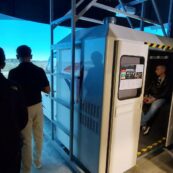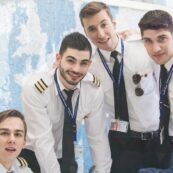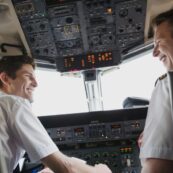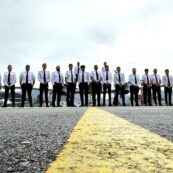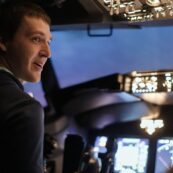From Zero to Airline Pilot: How Long Does It Take?

The process of becoming an airline pilot is an intense and structured one, which demands of the student a considerable amount of time, effort and financial investment. One of the questions most frequently asked by potential students is: “How long does it take to become an airline pilot?” The answer to this question varies and depends on the chosen course, location, and the pace of the student’s progression. In general, the whole process of becoming an airline pilot ranges from 18 months but can take up to 4 years.
Are you ready for a comprehensive overview of the different stages of airline pilot training and how long each of them takes: ground school, flight hours, and examinations?
Mapping the Journey: The Typical Timeline for Becoming an Airline Pilot
While there are several flight schools in Europe, they vary in terms of course length and quality. Many of them, especially those that follow the more traditional training model, offer longer courses. Others may offer a faster programme, but not always one of the highest quality, which can have a negative impact on the student’s ability to influence the industry.
What makes Egnatia Aviation different is, that they are able to offer students a top-quality education within a more reasonable time frame. Known for its proficiency in delivering high-quality programmes in less time, Egnatia Aviation offers an innovative approach to training that integrates all its forms—from flying to theory to simulation—in a single programme. This synergy, joined with its modern fleet and facilities, results in a curriculum that prepares trainees to tackle the challenges of the job in the shortest amount of time, but without needless distractions.
Breaking Down the Training Timeline
Ground School (6-9 months): Typically, a cadet pilot’s education starts in a classroom, where complex subjects like weather patterns, aerodynamics, aviation regulations, chart reading, and flight planning will be presented.
Flight Hours (9-18 months): Cadet pilots must complete a minimum of 200 flight hours to earn their Commercial Pilot License (CPL). This training period can sometimes be longer or shorter (depending on weather and cadet availability) than in other European countries, but on average the time required to complete all flying at Egnatia Aviation is less than in other countries. Thanks to the favourable flying conditions in Kavala, Greece, cadet pilots often take advantage of year-round flying, spending less time on the ground and accumulating flight time more effectively (average 9 months).
Exams and Certifications (2-4 months): Upon completing their flying hours and studying material, the cadet pilot is now prepared to take and pass written and practical exams for various licenses (especially in the case of pursuing a modular courses pathway). These exams are in place to ensure the student pilot can perform to the necessary professional standards associated with the license. At Egnatia Aviation, the student is monitored for progress throughout their training programme. Any shortfall in knowledge or performance is easily identified and usually rectified, reducing the time it takes to obtain a licence.
Fast-Tracking Success: How Egnatia Aviation Leads the Way in Airline Pilot Training
Whilst other modular or traditional flight schools are notorious for taking significantly longer to train pilots due to their less productivity and resources, with their Airline Integrated Programme (AIP) Egnatia Aviation has become one of the best at fast-tracking high-qualified cadets through their intensive training. The AIP in essence is a programme designed by the school for cadets to hit the right milestones effectively and at an efficient pace, without compromising the depth or standard of the training. The Airline Integrated Course has been designed with the needs of the modern airline in mind and is constantly being updated.
Strategic Airline Partnerships
One of the major benefits of Egnatia Aviation is their long-lasting relationships with large airline operators, such as Olympic Air, Aegean Airlines, Wizz Air and Iraqi Airways. With the airline-specific training programmes, the Flight Academy trains students to a high standard of airline system-based training before they even start work. This type of programme means that the cadets have sufficient technical knowledge and skills to start their aviation careers with ample qualifications and experience.
Modern Fleet and Advanced Facilities
Flight training is provided using a flexible, high-tech fleet of Diamond DV20s DA40s, DA42s and Elixir aircraft. Equipped with the best systems, advanced simulators and avionics components, cadets not only acquire pertinent skills relevant to their professional pursuits; they also get lessons on how to operate a commercial carrier flight, too. A meticulously maintained fleet ensures students have everything they need, all the time, with an unrivalled training location in Lydia Aerodrome.
Located in Kavala, Greece, Egnatia Aviation’s flight training school benefits from favourable flying weather all year round in the picturesque Aegean region. This means that students can progress through their training without the delays that often characterise other parts of Europe with less predictable flying weather. In addition, the new ATRO Centre at Lydia Aerodrome (Egnatia Aviation’s private airport) is revolutionising the way cadets are trained. At Lydia Aerodrome, cadets enjoy unparalleled access to state-of-the-art facilities designed for optimal learning. From a 1,330 metre approved runway to advanced simulators and spacious classrooms, every detail is tailored to ensure an immersive training experience.
Traditional vs Fast-Track Training: Which is Right for You?
When considering between traditional and fast-track training, future cadets must consider the pace of training, weather conditions, and regional training criteria.
Intensive Airline Integrated Programme or a Modular Courses Pathway?
Training Intensity: Egnatia Aviation’s Efficient Approach
While some schools offer modular training where there is a gap between theory and practical training, there are inherent problems with such method. The Airline Integrated Programme at Egnatia Aviation Academy is structured so that the theoretical and practical parts of the course are completed simultaneously, allowing students to complete the programme as fully qualified flight cadets in 17 months. This method of training promotes continuous development and enables future pilots to acquire skills more quickly; however, it is also more demanding and requires candidates to complete their training diligently.
Although most schools claim to have around the clock training opportunities, schools operating in busy airspace do not have enough flight slots available for cadet students. Egnatia Aviation’s Lydia Aerodrome provides students with a dedicated airspace for training, enabling them to complete their flight hour requirements more quickly and complete the course at a faster pace.
Weather Conditions: A Comparative Analysis
Many flight schools in Europe, particularly in the UK and Scandinavia are often affected by frequently-occurring adverse weather circumstances, such as fog, rain, and snow. Apart from causing delays and cancellations, they often have a direct effect on the duration of training programmes. Unlike its Northern counterparts, Egnatia Aviation in Kavala, Greece is blessed with excellent flying conditions with more than 300 sunny days throughout the year and only a few days of interruption from training. The trainees can then acquire required flight hours at a faster pace without the risk of delays, enabling them to complete their training at a faster rate.
Licensing Requirements and Accreditations
Flight schools that fall outside the EASA (European Union Aviation Safety Agency) purview may provide instruction under their respective aviation authorities, and that often means meeting additional requirements for worldwide certification. As an EASA certified ATO, Egnatia Aviation and its cadets operate at the highest level of safety and training standards. Graduating cadets earn an ATPL license and training record book that is truly recognized worldwide. This easily opens the door to a competitive edge on the international stage when seeking employment with airline partners based in Europe and worldwide. In addition, Egnatia Aviation is fully approved by the UAE GCAA to offer the full range of its courses (Airline Integrated Programme and Modular Courses Pathway), which is an added advantage that appeals to students from all over the world.
Mentorship and Soft Skills Development
Some flight schools may fail to adequately develop the soft skills or personal attributes of cadets, devoting most of the training process to technical instruction. Egnatia Aviation, on the other hand, offers a highly structured programme of mentoring and individual coaching that follows cadets through every step of the process, helping them to develop their range of technical skills and professional behaviour.
Egnatia Aviation also provides the ideal backdrop for motivation and focus, with the uplifting and friendly environment at its base in Kavala helping its cadets to build their confidence as future airline pilots.
Your First Step Towards the Skies
Choosing the best flight school is one of the most important steps in your life. A fast-track flight training course allows you to achieve your dream in the shortest possible time, without sacrificing the highest quality training and course standards. As Egnatia Aviation stands for efficiency, quality and innovative approach, their training is an excellent way for those who want to be in the aviation industry as soon as possible.
The worldwide pilot shortage, which Boeing’s latest analysis highlights, makes now a better time to start training, than ever before. Egnatia Aviation’s Airline Integrated Programme ensures an optimized and direct-airline-pilot-career-path selection.
Contact us now and secure your professional aviation future!
